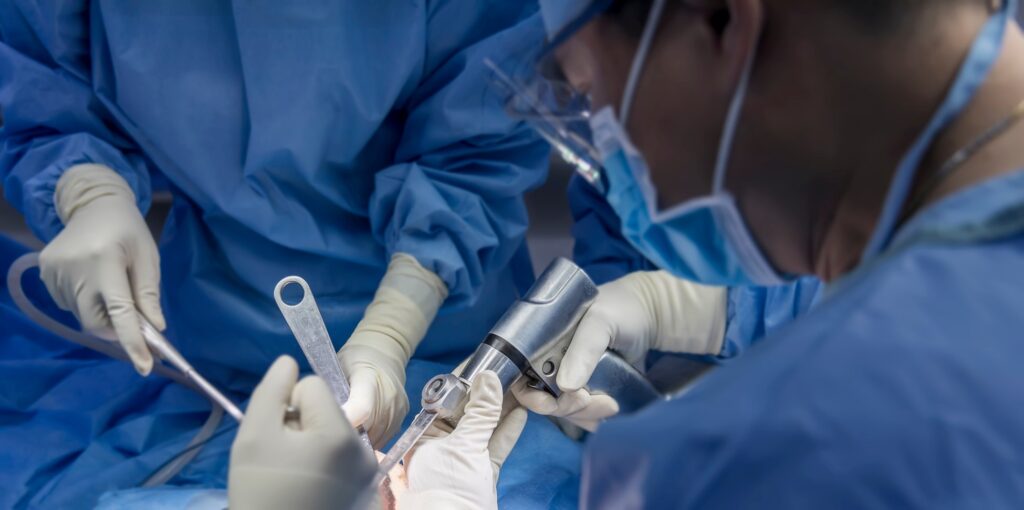Knee replacement surgery, also known as total knee arthroplasty, is a medical procedure that involves the replacement of a damaged or worn knee joint with an artificial implant. This surgery is typically recommended for people who suffer from severe knee pain or mobility problems that cannot be effectively treated with non-surgical methods.
Adults of any age might need knee replacement surgery, but it is mostly done in people between 60-80 years.
Total Knee Arthroplasty: When is it Required?
Total Knee Replacement Surgery helps patients with:
- Severe knee pain (arthritis)
- Swelling and stiffness in the knee joints
- Wear and tear of knee joints
- Knee injury
- Reduced mobility
It is a major surgery and requires rehabilitation after the surgery.
Avoid Knee Replacement Surgery: Preventive Measures
- Low-impact exercises (for strength and mobility)
- Weight loss (to reduce pressure on knees)
- Physical therapy (for strength and balance)
- Healthy diet (green leafy vegetables, almonds, omega-3 fatty acids, and calcium-rich foods)
- Medication (as advised by the doctor)
Pre-operative Preparation: Total Knee Replacement Surgery
- Medical consultations and physical evaluations 1 month before the surgery
- Tests include regular blood tests, electrocardiograms (ECGs), and urine tests
Note
- Do not take any medications before the surgery
- You will be instructed to fast a few hours before the surgery
Knee Replacement Surgery: What to Expect?
- Surgery is usually performed under anesthesia.
- The doctor might also inject a numbing medication around the joint to help block pain after the surgery.
- You will need to stay in the hospital for 1-2 days after the surgery.
- You will require physical therapy to strengthen the knee and reduce the risk of future complications.
Knee Replacement Surgery: Post-Op Care
Reduce the chance of blood clots after the surgery with these simple measures:
- Move slowly (With crutches or a walker soon after surgery)
- Apply Pressure (Wear elastic compression stockings)
- Take Medications (Blood thinners) as prescribed by the doctor
- Physical Therapy (Breathing exercises and knee exercises)
Dos and Don’ts: Knee Replacement Surgery
- DO take iron supplements to aid wound healing and muscle strength
- DO use crutches or a walking stick
- Do take medications as instructed
- DO physical therapy as instructed
- Do Not soak the wound until the scar is completely healed
- Do Not bend down and lift heavy objects
- Do Not stand still for long periods
Things to Avoid After Knee Replacement Surgery
Avoid-
- Household activities for 3-6 weeks
- Sex for 4-6 weeks
- Work for 4 weeks or more
- Swimming for 6-8 weeks
- Driving for 2-6 weeks
After Knee Replacement Surgery: When to Seek Medical Help?
Signs of Blood Clot: Sudden shortness of breath, chest pain, and cough
Signs of Infection: Fever, redness or tenderness of the knee, and pus drain from the surgical wound.
Knee Replacement Surgery: Myth & Fact
Myth: You cannot undergo knee replacement surgery if you have diabetes and high blood pressure.
Fact: Diabetes or blood pressure is no longer a bar for knee replacement surgery.
Knee Replacement Surgery: Myth & Fact
Myth: You will need regular physiotherapy after surgery, and recovery is very slow.
Fact: Most patients do not need a physiotherapist. After the surgery, your doctor will instruct certain exercises and activities to practice at home. Patients usually start walking after 4 weeks of treatment.
Conclusion: Knee replacement surgery can greatly improve the quality of life for individuals suffering from severe knee pain, stiffness, and reduced mobility. By taking preventive measures and seeking prompt medical attention for any post-operative complications, individuals can successfully recover and return to their daily activities with a newly restored knee joint.

